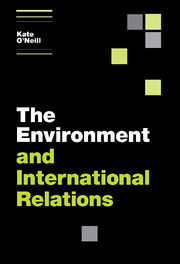Book contents
- Frontmatter
- Contents
- Preface
- Acknowledgements
- List of commonly used abbreviations
- 1 Introduction: The environment and international relations
- 2 International environmental problems
- 3 Actors in international environmental politics
- 4 State-led global environmental governance: International cooperation and regime formation
- 5 The impacts and effectiveness of environmental treaty regimes
- 6 Global economic governance and the environment
- 7 Non-state global environmental governance
- 8 Conclusions: The environment and international relations in the twenty-first century
- References
- Index
- References
5 - The impacts and effectiveness of environmental treaty regimes
Published online by Cambridge University Press: 05 June 2012
- Frontmatter
- Contents
- Preface
- Acknowledgements
- List of commonly used abbreviations
- 1 Introduction: The environment and international relations
- 2 International environmental problems
- 3 Actors in international environmental politics
- 4 State-led global environmental governance: International cooperation and regime formation
- 5 The impacts and effectiveness of environmental treaty regimes
- 6 Global economic governance and the environment
- 7 Non-state global environmental governance
- 8 Conclusions: The environment and international relations in the twenty-first century
- References
- Index
- References
Summary
In Chapter 4, we examined the factors that influence the negotiation of environmental treaty regimes. In this chapter we turn to the question of regime effectiveness. Do states actually comply with multilateral environmental agreements? Do existing MEAs actually help solve the problems they are designed to address? Why are some treaty regimes more effective than others? What sorts of broader impacts do international environmental regimes have?
The field of international environmental politics leads within the discipline of international relations in generating research on the impacts and effectiveness of international cooperation (Zürn 1998; O'Neill et al. 2004). Part of the reason for this is the problem-driven nature of the field. However, it is also the case that with such a large number of environmental treaties, many of which have been in place for many years, scholars began moving beyond the question of what makes states cooperate in the first place to examining the impacts of environmental treaty regimes as they mature. This work has helped drive research in other areas of international relations theory and global governance. In fact, many of these same issues and concerns apply to other mechanisms of global environmental governance, such as the private regimes we examine in Chapter 7.
This chapter addresses the following major questions within this sub-field of international environmental politics, questions that apply equally well to other arenas and modes of global governance:
How do we define “regime effectiveness” and classify the impacts of a treaty regime?
How can we overcome the methodological challenges of demonstrating the causal impacts of international regimes?
[…]
- Type
- Chapter
- Information
- The Environment and International Relations , pp. 104 - 134Publisher: Cambridge University PressPrint publication year: 2009

